#dobbs house
Explore tagged Tumblr posts
Text

Cover of the breakfast menu at the Dobbs House restaurant (1970).
268 notes
·
View notes
Text
Wow if only Obama had convinced Ruth Bader Ginsburg to retire in 2012 and convinced Harry Reid to change the senate rules so he could confirm her replacement with zero Republican votes... if only he'd done that, a decade later the Supreme Court would have overturned bodily autonomy for half this country 5-4 instead of 6-3 :)
#i'm not saying there weren't some other decisions where having one more would have helped but#i see this bs tied to dobbs specifically SO OFTEN#go egg anthony kennedy's house#also learn to count
261 notes
·
View notes
Text
Is "committing to radical change" a viable way to STAY elected? I'm asking in all sincerity, because I haven't researched it at all. But judging from the level of political knowledge I see around me, it sounds like a good way to get elected for one term, then dumped when your single vote in a 435-person House doesn't actually accomplish all that much. The people demanding radical change don't seem to have much patience for anything gradual - if you don't fix everything NOW, then you've sold out. AOC's done better, but she's also kinda assimilated enough to have a voice with the leadership.
also while we're at it, "progressive" doesn't mean anything and doesn't describe any specific ideology and is a cop out term for people who want leftists to vote for them while not losing out on corporate and further right support. meaningless catch all terms for ideologies that exist to appease rich donors result in people like john fetterman getting elected on vague promises.
it has been shown time and time again that committing to actual radical change and standing by it is the way forward and actually a viable way to get elected, making empty promises using vague words that sound radical and then slowly assimilating into the establishment has yet to result in meaningful change
#people are still blaming Biden for Dobbs#and don't know the filibuster exists#and don't know which party holds which house
827 notes
·
View notes
Text
#Hill & Holler Mafia / White House Road along the Copperline / Ridge Runnin' SOB#Red Dobbs x Colleen Delaney#partially Alan Briggs before he was gutted like a fish down at The Lamp Lighter one night#Spotify
0 notes
Text
They are using the handmaids tale as a blueprint. This is what happens when you vote republican. Think about this the next time they use words like economy, funding, or money. They don’t give two shits what is in your pockets. All they want, all they care about is domination of all facets of life in the usa.
#america#usa is hell#usa#united states#house speaker#lgbtqai#pride#rvw#roe wade#roe v wade#dobbs v. jackson women's health organization#abortion#crimes against humanity#this is the hellscape they are trying to create
0 notes
Text
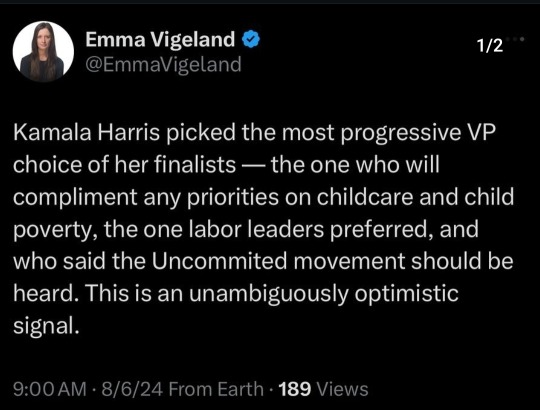
Walz has served as Minnesota’s governor since 2019 after 12 years in the House of Representatives and now chairs the Democratic Governors Association. He has built a reputation as a folksy politician who can get things done, as Minnesota has adopted a number of progressive laws during his tenure. According to a poll conducted earlier this year, Walz enjoys an approval rating of 55% among Minnesotans. Since Minnesota Democrats achieved a legislative trifecta in the 2022 elections, Walz and his allies have used their power to push a slate of progressive policies. The governor has signed bills protecting abortion access, expanding background checks for prospective gun owners and legalizing recreational marijuana. “Right now, Minnesota is showing the country you don’t win elections to bank political capital,” Walz said last year. “You win elections to burn political capital and improve lives.” That philosophy has endeared him to progressives, who threw their support behind him as the veepstakes kicked into high gear over the past two weeks. They reshared clips of Walz lovingly mocking his daughter’s vegetarianism and tinkering with his car to paint him as the dad that America needs right now.
This is fucking awesome! Honestly, sincerely good news and a very promising pick for the potential Harris Administration. An aggressive, unabashed, popular, populist left-winger with a track record of enacting real, substantive help for people is capital-G Great.
What has he done, specifically?
Abortion rights
In a 1995 ruling, the Minnesota Supreme Court upheld abortion rights in Minnesota. In January 2023, Walz signed the PRO Act (Protect Reproductive Options Act) into law, making abortion a "fundamental right," as well as access to contraception, fertility treatments, sterilization and other reproductive health care.
The law made Minnesota the first state to codify abortion rights in the aftermath of the U.S. Supreme Court's 2022 ruling in the case of Dobbs v. Jackson Women's Health Organization, which nullified Roe. v. Wade after nearly 50 years of precedent. In April 2023, Walz signed the Reproductive Freedom Defense Act into law, shielding women and providers from any legal action originating from the patient's state.
Pro-LGBTQIA+ legislation
In March 2023, Walz signed an executive order to protect the right of residents to have access to gender-affirming health care. Weeks later, he signed the "Trans Refuge" bill, banning the enforcement of arrest warrants, extradition requests and out-of-state subpoenas for those who traveled to Minnesota for care.
"When someone else is given basic rights, others don't lose theirs," Walz said. "We aren't cutting a pie here. We're giving basic rights to every single Minnesotan."
Paid family, medical and sick leave
In May 2023, Walz signed a law creating a state-run program to provide paid family and medical leave for Minnesota workers, funded by a 0.7% payroll tax on employers, by 2026.
Legalization of recreational marijuana
In May 2023, Minnesota became the 23rd state in the nation to legalize recreational cannabis use. Three months later, people 21 and older could start to possess certain amounts of marijuana at home and on their person, in addition to legally growing up to eight plants at a time.
Restoration of voting rights for former felons
In March 2023, Walz signed a bill that restored the right to vote to more than 50,000 convicted felons who had already served their time.
Universal school meals
Amid the increase in food insecurity for many Minnesotans during the pandemic, and the subsequent strain on the state's food shelves that remains to this day, Walz signed a bill in March 2023 that ensures all K-12 students in the state have access to free breakfast and lunch on school days.
Do you know what makes this even better?

Fuck 'Em. I know negative partisanship is important and can help motivate right-wingers to vote, but they're going to vote anyway. And him being afraid of Walz is just a sign that he's a good pick, in policy and politics.
#donald trump#kamala harris#2024 election#Tim Walz#progressive politics#original content#politics#good news#legalization#trans care#voting rights#lgbtqia#worker rights
2K notes
·
View notes
Text
cruel - march 5 - jegulus - @taylorswiftmicrofic - word count: 300
“Regulus.”
Regulus heard a familiar, low voice from behind him, and felt two strong arms wrap around his waist. “You know, you ought to warn me before doing that,” he said as he turned in the embrace, facing James Potter head-on and giving him a scathing look. “I tend to curse first, and ask questions later.”
“Hm,” James nodded, smirking. “Yet, being at the business end of your wand only makes me feel positive feelings, love.”
Regulus rolled his eyes. “What? Why’re you interrupting me here?” He was in the Potions classroom, working on an advanced brew.
Loosening his hold, James stepped back. “An interesting thing happened to me today,” he said conversationally, but his expression was stern. “Henrietta Dobbs, from your house? She asked me out.”
“Interesting,” Regulus said in a flat voice, betraying nothing. “I expect you said no.”
“I did,” James grinned. “I told her we’re seeing each other. But then she told me that when you heard her talking about the idea, you encouraged her.”
Still not giving in, Regulus just raised his eyebrows. “Hm. That is interesting.”
A hand slowly moved to Regulus’s waist again and gripped him possessively. “So?” James asked, tilting his head.
“Figured the best way to remind her you’re mine, was to have you tell her yourself. Straight from the stag's mouth, as it were,” Regulus said lightly, grinning wickedly.
James rolled his eyes, face falling into a reluctant smile. “That’s cruel, love.”
“And yet, you don’t seem angry,” he observed, stepping closer, so their bodies were aligned.
The Gryffindor just chuckled. “I have a very fucked-up sense of what makes me angry and what makes me horny, it seems.”
“Well,” Regulus said, biting his lip. “That’s great news for me.”
They both crashed their lips together at the same time.
#marauders#harry potter#marauders era#marauders fandom#fanfic#harry potter marauders#the marauders#hp marauders#marauders harry potter#the marauders era#marauder era#marauders fanfiction#marauders fic#marauders fanfic#james potter x regulus black#james x regulus#regulus x james#regulus black#regulus arcturus black#regulus deserved better#regulus black x james potter#jegulus#starchaser#sunseeker#jegulus microfic#james fleamont potter#james potter#james loves regulus#regulus
753 notes
·
View notes
Text


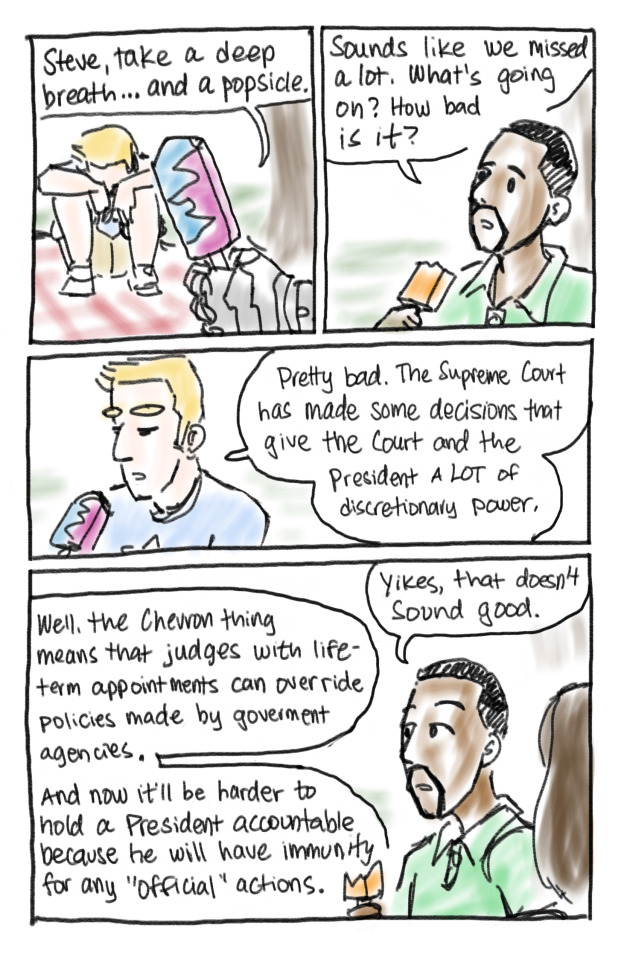
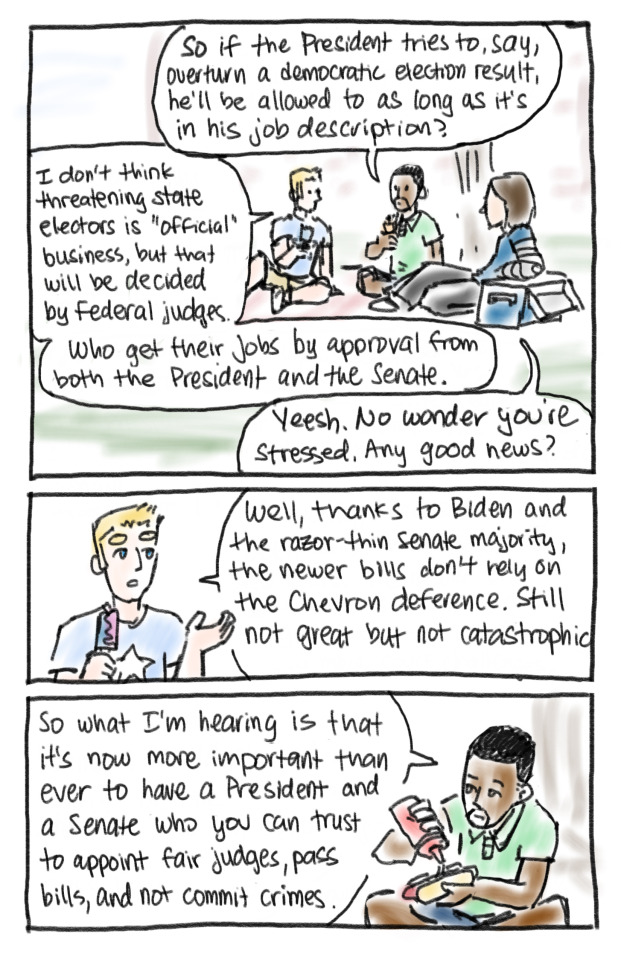
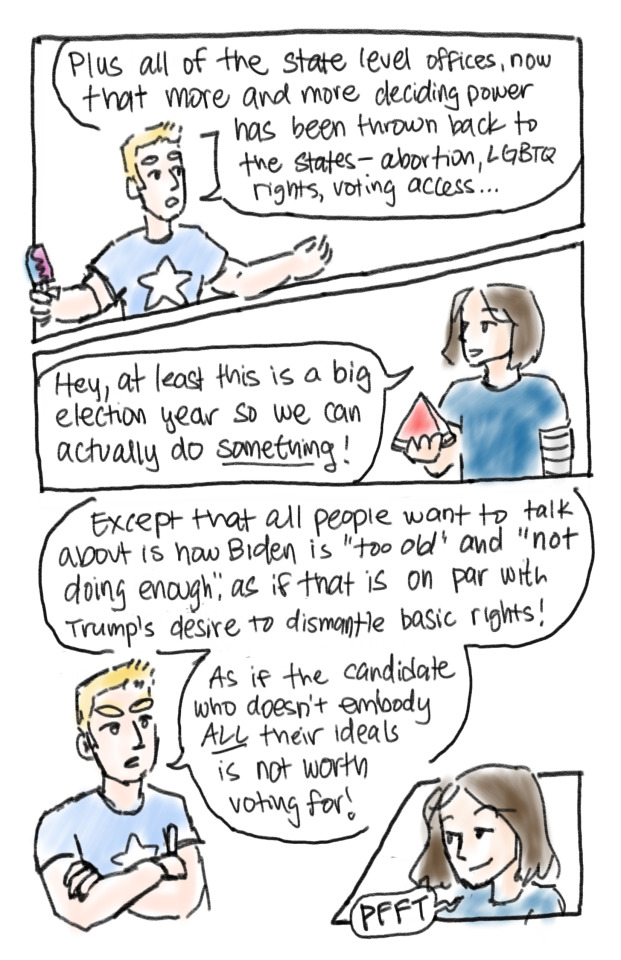
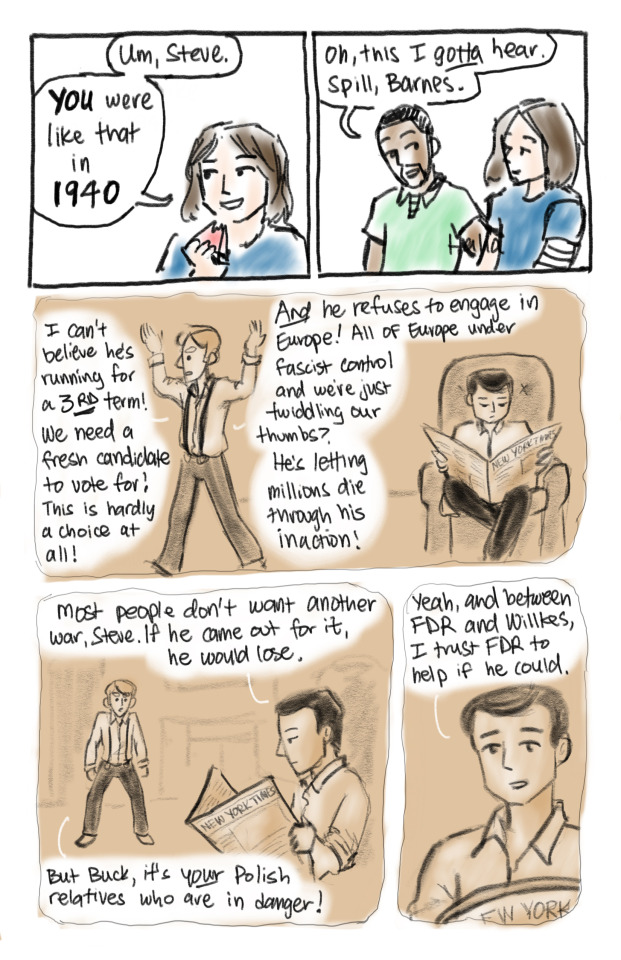
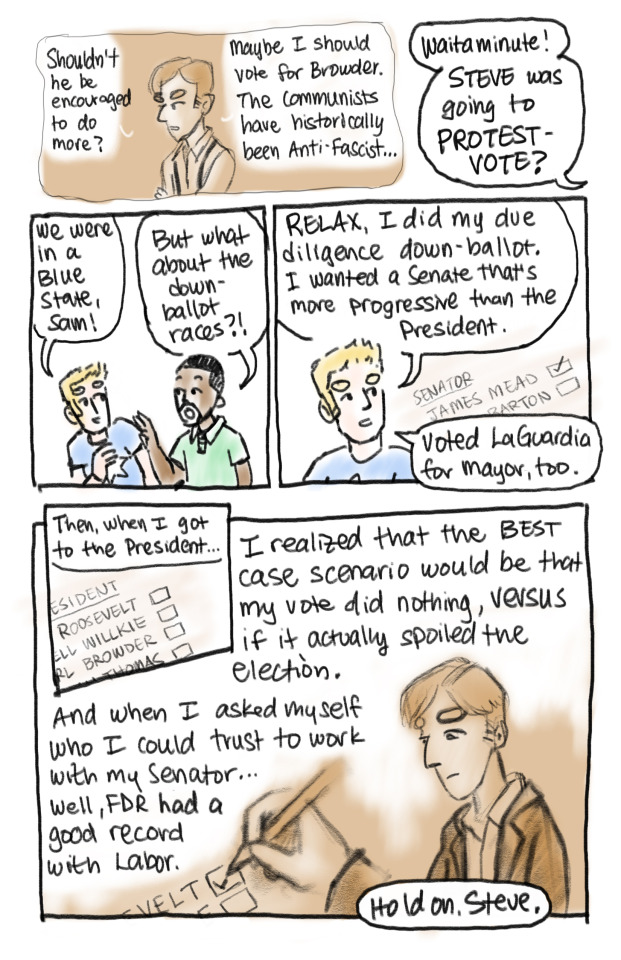
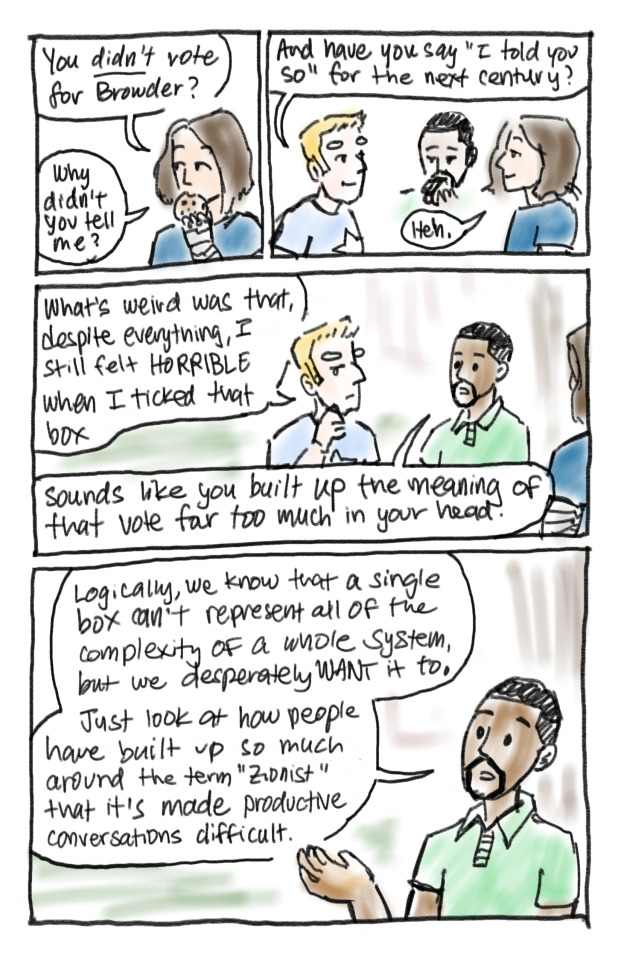
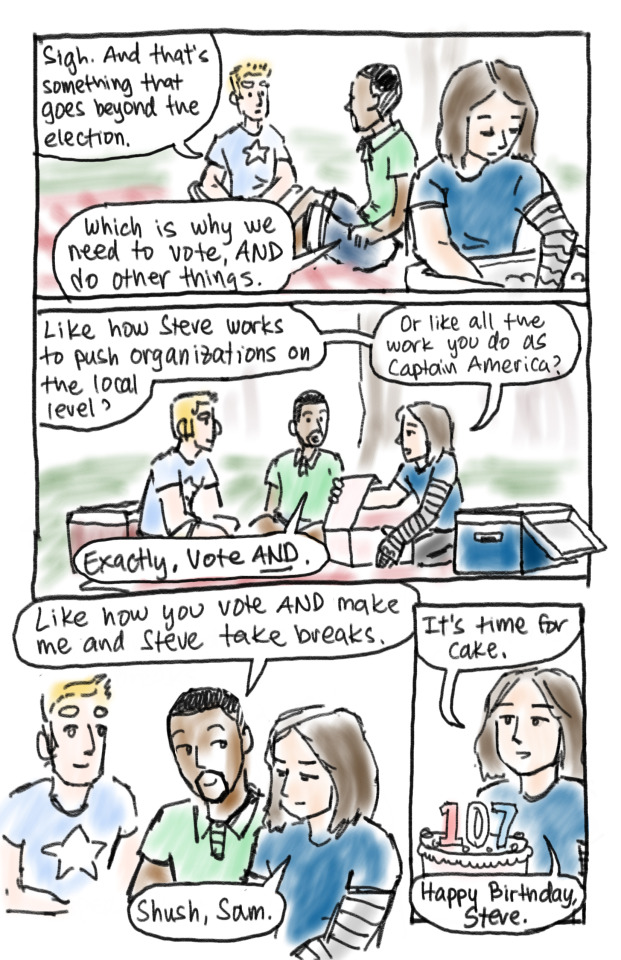
Happy July 4th, everyone, and good luck to the UK voters out there!
Wow it's Year 11 of doing these!! Here's the AO3 link to the past 10 years, and here's the tumblr link.
Reminder that this is a long game -- some of the judges making decisions were appointed back in the 80s. Many of the cases that were decided this round were from Trump's term. So it's going to take long-term, consistent voting over a decade to start tipping things in the other direction. (Which I talked about in 2018 re: Trump shenanigans and 2022 re: Dobbs).
A lot has been done by the Biden administration (I'm assuming most folks have seen this post by boreal-sea with their very helpful sources), and much of that will be overturned by Trump, especially if he gets the Senate, and especially now that he would have a blank check for anything "official". So let's make sure that doesn't happen.
And even if Trump does get elected, your decisions down-ballot might effect control of the House or Senate, or might make it easier to vote next time, plus the whole plethora of state and local issues. It's Republican state attorney generals who are challenging climate regulations, for example.
Plus, when you really get down to it, only one of the candidates plans on pardoning himself and all his friends if he wins, and attacking the government if he loses. Maybe that guy shouldn't be the President.
If you're new to voting, remember to check voter registration deadlines! I'm a permanent vote-by-mail voter and it's so nice. :)
Transcript under the readmore
Page 1: Sam and Bucky meet up with Steve for a picnic. Steve: Thought you guys were still in Sudan? Bucky: I’m forcing Sam to take a break.
Sam collapses onto the picnic blanket. Sam: Oof, it just never stops, does it? Steve: Nope.
Bucky hands Sam an orange popsicle. Bucky: Eat and relax for a bit, Sam. Sam: Thanks.
Page 2: Bucky asks Steve: How are things state-side? Steve responds: HORRIBLE. Bucky: I thought you’ve been tentatively hopeful about what Biden has been able to achieve? Steve: I was! Student loans, child care, climate regulations, infrastructure, labor, trans rights … he’s quietly done a lot through regulatory improvements and congress bills. But now all people will talk about is how he’s OLD. And then there’s the Supreme Court’s decisions … Chevron and immunity… Steve puts his head in his hands, while Sam and Bucky look on with some concern.
Page 3: Bucky hands Steve a blue/raspberry popsicle: Steve, take a deep breath, and a popsicle. Sam: Sounds like we missed a lot. What’s going on? How bad is it? Steve: Pretty bad. The Supreme Court has made some decisions that give the Court and the President A LOT of discretionary power. Sam: Yikes, that doesn’t sound good. Steve: Well, the Chevron thing means that judges with life-term appointments can override policies made by government agencies. And now it’ll be harder to hold a President accountable because he will have immunity for any “official” actions.
Page 4: Sam: So if the President tries to, say, overturn a democratic election result, he’ll be allowed to as long as it’s in his job description? Steve: I don’t think threatening state electors is “official” business, but that will be decided by federal judges. Who get their jobs by approval from both the President and the Senate. Bucky: Yeesh. No wonder you’re stressed. Any good news? Steve: Well, thanks the Biden and the razor-thin Senate majority, the newer bills don’t rely on the Chevron deference. Still not great but not catastrophic. Sam, squirting ketchup on his hot dog: So what I’m hearing is that it’s now more important than ever to have a President and a Senate who you can trust to appoint fair judges, pass bills, and not commit crimes.
Page 5: Steve: Plus all of the state level offices, now that more and more deciding power has been thrown back to the states — abortion, LGBTQ rights, voting access… Bucky: Hey, at least this is a big election year so we can actually do something! Steve, with his arms crossed, looking surly: Except that all people want to talk about is how Biden is “too old” and “not doing enough,” as if that is on par with Trump’s desire to dismantle basic rights! As if the candidate who doesn’t embody ALL their ideals is not worth voting for! Bucky interrupts with a smart and a loud “PFFT.”
Page 6: Bucky: Um, Steve. YOU were like that in 1940. Sam, nudging Bucky: “Oh, this I gotta hear. Spill, Barnes.” In sepia, Steve is pacing around their apartment while Bucky is sitting and reading a newspaper. Steve: I can’t believe he’s running for a 3rd term! we need a fresh candidate to vote for! This is hardly a choice at all! AND he refuses to engage in Europe! All of Europe under fascist control and we’re just twiddling our thumbs? He’s letting millions die through his inaction! Bucky: Most people don’t want another war, Steve. If he came out for it, he would lose. Steve, indignant: But Buck, it’s your Polish relative who are in danger! Bucky, closing his newspaper and looking at Steve: Yeah, and between FDR and Willkes, I trust FDR to help if he could.
Page 7: Steve, in sepia, looking away: Should he be encouraged to do more? Maybe I should vote for Browder. The Communists have historically be Anti-Fascist.
Sam interrupts off-screen: Waitaminute! STEVE was going to PROTEST-VOTE? Steve: We were in a Blue State, Sam! Sam: But what about the down ballot races?! Steve: RELAX, I did my due diligence down-ballot. I wanted a senate that’s more progressive than the President.Voted LaGuardia for Mayor, too. Steve hesitates: Then, when I got to the President… I realized that the Best case scenario would be that my vote did nothing, versus if it actually spoiled the election. And when I asked myself who I could trust to work with my Senator… well, FDR had a good record with Labor. (sepia shot of young Steve voting) Bucky interrupts: Hold on, Steve.
Page 8: Bucky, eating a cookie, arching an eyebrow: You didn’t vote for Browder? Why didn’t you tell me? Steve: And have you say “I told you so” for the next century? Bucky: Heh.
Steve, with hand on his chin: What’s weird was that, despite everything, I still felt HORRIBLE when I ticked that box. Sam: Sounds like you built up the meaning of that vote far too much in your head. Logically, we know that a single box can’t represent all of the complexity of a whole system, but the desperately WANT it to. Just look at how people have built up so much around the term “Zionis” that it’s made productive conversations difficult.
Page 9: Sam and Steve speak in the background while Bucky reaches into the cooler and pulls out a box. Steve: Sigh. And that’s something that goes beyond the election. Sam: Which is why we need to vote, AND do other things. Bucky, looking at Steve and Sam: Like how Steve works to push organizations on the local level? Or like all the work you do as Captain America? Sam: Exactly. Vote AND.
Sam looks at Bucky fondly: Like how you vote AND make me and Steve take breaks. Bucky, looking stern because he can’t handle compliments: Shush, Sam.
Bucky holds up a cake that has the number “107” on it: It’s time for cake. Happy Birthday, Steve.
#happy birthday steve#supreme court#election#steve rogers#bucky barnes#sam wilson#11th year holy fuck#mine#my comic#oh hey i'm traveling for the next month so i might be not very responsive#longpost is long but I think everyone has the longpost shrinker by default now?
1K notes
·
View notes
Text

The Supreme Court began another term this week. Most court watchers and other analysts have been reluctant to accept the truth of something I’ve long argued: that the Roberts Court is as agenda-driven as the House or Senate Republican caucuses. They have already put their thumbs on the scale in this election and are poised to intervene again if the results don’t suit them.
We are at least a decade past the point when we should be convinced of what Abraham Lincoln stated in his first inaugural address:
"The candid citizen must confess that if the policy of the Government upon the vital questions affecting the whole people is to be irrevocably fixed by the decisions of the Supreme Court . . . the people will have ceased to be their own rulers.1 " [emphasis added]
[...] The interests behind the Federalist Society (FedSoc) – in particular the Kochs, Leonard Leo, and other plutocrats and theocrats – are the same interests who have spent the 21st century funding and organizing the MAGA takeover of the Republican Party. I’ve coined the portmanteau “plutotheocratic” as a compact way of describing this coalition of interests. (See the Appendix for a brief overview of the history and major players in the plutotheocratic coalition.) The six FedSoc justices are properly understood not as “umpires” scrupulously “calling balls and strikes,” but as politicians in robes. However, it’s important to recognize what kinds of politicians we are dealing with. The FedSoc Six are first and foremost Federalist Society operatives. That means that they usually act in the interests of the Republican Party – except when the partisan agenda of the day conflicts with the long-term plutotheocratic agenda. [...]
Creating a Death Spiral for Democracy
For about 40 years, we saw a fairly predictable ebb and flow in the federal commitment to advancing greater freedom and equality and to constraining corporate threats to consumers, working people, and the environment. Under Republicans, this commitment would ebb; under Democrats, it would flow. But beginning in 2010 with the Citizens United decision, if not a bit earlier, Roberts’s agenda-driven majority turned that ebb and flow into a death spiral for American democracy.
Decision after decision shifted more and more electoral power to the FedSoc Six’s plutotheocratic sponsors – who in turn used that power to take greater control of Red state governments and purge Republican congressional caucuses of RINOs – which in turn was used to place more and more Federalist Society true believers on the Federal bench, and eventually the Supreme Court.

[See more excerpts below the cut.]
[...] The Supreme Court has, of course, made many rulings that overturned previous major precedents or led to significant social change. But consider:
Brown v. Board of Education - Earl Warren and the other eight justices joining him did not owe their positions to a cabal of civil rights activists who had contributed billions of dollars to law schools, foundations, think tanks and political campaigns.
Roe v. Wade - Harry Blackmun and the six justices joining him on Roe v. Wade did not owe their positions to a cabal of pro-choice activists who had contributed billions of dollars to law schools, foundations, think tanks and political campaigns.
Gideon v. Wainwright - Hugo Black and the eight other justices joining him did not owe their positions to a cabal of indigent prison inmates who had contributed billions of dollars to law schools, foundations, think tanks and political campaigns.
But the members of the Roberts majority do owe their positions to a cabal of plutocrats, who directly benefited from rulings like Citizens United and Loper Bright, and theocrats, who have a fierce ideological commitment to outcomes like Dobbs and Hobby Lobby, who together have contributed billions of dollars to law schools, foundations, think tanks and political campaigns. Again, per Lincoln, we have ceased to be our own rulers.
The Federalist Society literally planned and executed an unprecedented transfer of unchecked political power to their own loyalists.5 They brag about this in unguarded moments and in their “safe spaces.”
#the supreme court#the federalist society#death spiral for democracy#politicians in robes#republicans#plutotheocratic takeover of the u.s.#“we have ceased to be our own rulers”#michael podhorzer#weekend reading
507 notes
·
View notes
Quote
The five Justices in the majority opinion, however, went farther than necessary to insulate insurrectionists from being disqualified from federal elections. They didn’t just rule that states cannot disqualify Trump, or Presidential candidates, but rather that states cannot disqualify any insurrectionist candidates for federal office. The Justices gave all the power to a notoriously dysfunctional Congress to do so, even though Section Five did not explicitly make Congress the sole enforcing authority of Section Three. As in the Dobbs case that overturned 50 years of Roe v. Wade, the conservative principle of “judicial restraint” does not exist with this Supreme Court. Republicans like to blast “activist judges,” but as we see yet again, an “activist judge” is just someone who rules against you. Under the Supreme Court’s expansive ruling, a state is currently unable to disqualify a candidate for federal office who engaged in insurrection, even if that person has been charged and convicted of insurrection. Even a federal court would be unable to bounce an insurrectionist from the ballot absent a law enacted by Congress.
There's No Restraining This Activist Supreme Court
This SCOTUS needs to be burned to the ground and rebuilt with actual Justices, instead of these unelected activists who are opposed by nearly 8 in 10 Americans.
The Courts are not going to save us. The Courts aren’t even going to enforce existing laws that were written to protect us. The Courts are actively working against Democracy and doing everything The Courts can do to hasten Fascism’s hold on the levers of power. Fascism has already come to America. It is taking root in every state that is under Republican occupation, urged on and enabled by this SCOTUS majority, and their ideological partners in the House and Senate. The only way we can stop this from spreading like a Zerg creep over all of America is to overwhelmingly put Democrats into office and then force them to act.
If Congress won’t do something to limit the grotesque abuses of power by people who don’t interpret the law, but make law from the bench, it will be up to America to rise up and demand action.
I refuse to be ruled by 6 Christofascist Nationalists, and I refuse to sit quietly while people who have the legal means to do something throw up their hands and furrow their brows.
This is going to be our last election that matters, if we don’t.
I’m serious. If Trump somehow gets into the White House again, we will never have another election in my lifetime.
LISTEN TO ME: any vote that is not for Joe Biden is a vote to end Democracy in America. Any vote that is not for a Democrat is a vote to end Democracy in America. When I see people insisting they won’t support Biden or Democrats because they aren’t Left enough, I want to pull my hair out. The stakes are too high for all of us -- especially the most vulnerable among us -- to indulge temper tantrums.
It’s a very simple choice: you can vote for Biden and Democrats, or you can vote to turn America into a Christian Nationalist Theocracy, ruled by autocrats.
This will be our last free election, if Republicans are not resoundingly and forcefully rejected at all levels.
585 notes
·
View notes
Text
It is extremely disturbing how many posts I see claiming that Roe v. Wade was overturned on Biden's watch and blaming him and the Democratic Party for it. It's disturbing on a number of levels.
First, it was Trump and Bush-appointed justices who handed down the Dobbs decision. This is a flagrant example of blaming Democrats for things Republicans did, and not coincidentally is one of the the most widely felt differences between the two parties. As a result, it's usually the first example Democrats and their allies point to; this misappropriation suggests a deliberate attempt to undercut that fact.
Secondly, and related to the first point, it obfuscates who the real enemy is, and I am comfortable using word "enemy" to describe the Republican Party because of the policies they advocate and enact. The truth is that states controlled by the Republican Party were where the effects of Dobbs are most severely felt, while states controlled by the Democratic Party are passing laws to protect abortion. It is important to know which party opposes abortion and which party supports it. If the Republicans gain control of the House, Senate, and White House, they will pass a national abortion ban, as they have done at the state level in several places.
Thirdly, blaming Biden for Dobbs demonstrates a very concerning lack of understanding of how the government functions. The judiciary is its own branch of government; judges are appointed by the president and confirmed by the senate. It doesn't matter who is president when a decision is handed down, it matters who was president when the justices were appointed. People sometimes react to this by moving the goalposts and claiming the real issue was a failure by Democrats to "codify" Roe v. Wade. I am not sure what "codify" means in this context, and I'm not sure they are either. One thing it does not mean is that congress can pass a law saying "abortion is legal forever." Republicans could easily repeal such a law and it the federal government cannot necessarily prevent states from restricting abortion at the state level. Roe v. Wade was a ruling stating that the constitution guaranteed a right to privacy, which included the right to have an abortion. This prevented abortion restrictions in a way federal law cannot. That doesn't mean passing federal law protecting abortion is a bad idea, but it isn't a foolproof protection. It's fair to argue that the Democratic Party and the left of center generally were complacent about abortion. The form of this complacency was not taking the courts seriously, while the right spent fifty years openly filling the courts with anti-abortion judges.
The last thing that worries me is that this is popping up phrased almost the exact same way all over the place. I am afraid that it is not merely incompetence, but intentional misinformation, that is then repeated by the incompetent who believe it.
I know some will probably dismiss this post as being from a "vote harder" liberal Biden supporter, but whatever your feelings about Biden, the Democratic Party, or the democratic process in the U.S., you should care about the truth. The truth is that Roe v. Wade was overturned by Republican-appointed judges and abortion bans are being enacted by Republican elected officials, and Joe Biden opposes these things. You can do with that information whatever you wish, but you denying it is dishonest.
#you can't build a leftist movement on dishonesty#i might have to mute this one too but i needed to say it
6K notes
·
View notes
Text
youtube
Abortion is the major issue in Virginia's state legislative elections on Tuesday.
Republicans control the governor's office and the House of Delegates – the lower chamber of the Virginia legislature. Democrats hold a narrow majority in the Senate – the upper chamber.
Virginia is the only state in the South which observes full reproductive freedom. GOP Gov. Glenn Youngkin (AKA: Glenn Trumpkin) is pushing a measure to restrict abortion. Trumpkin has national ambitions and wants to re-enforce his hardline credentials by pandering to the MAGA crowd.
If Democrats do not end up with control of at least one chamber of the legislature after Tuesday's election then Virginia will join the rest of the South as a place where Republican officials have a virtual regulator in every OBGYN office in the state.
Legislative elections can be decided by very narrow margins. And the tightest race for the Virginia Senate seems to be the 24th Senate District where incumbent Democrat Monty Mason is fighting a challenge by Republican J.D. Diggs. In a Washington Post article about the race in the 24th district, Karen Tumulty reports...
Across Virginia, abortion has become the overriding issue on the airwaves for the Democrats, highlighted in more than 40 percent of their ads. Republicans are talking about it in only 3 percent of theirs, according to the tracking firm AdImpact. But Mason noted: “People bring it up to me. I don’t have to lead with it in a lot of places.” That is because Virginia is the last Southern state where the procedure has remained widely available after the Supreme Court overturned Roe v. Wade in 2022. Abortion in Virginia is legal up to 26 weeks of gestation.
A vote in the Virginia legislative election is important anywhere in the state. But it's even more important in these swing districts.
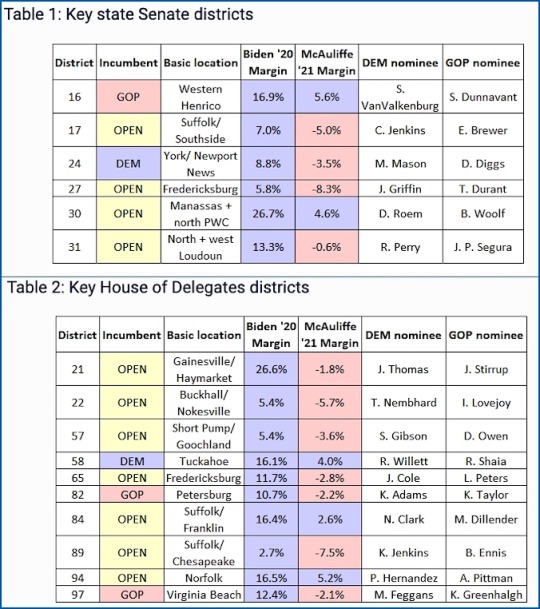
^^^ those charts come from this excellent article at the UVA Center for Politics.
The Race for Virginia’s Legislature, Part Two
If you'd like to know which legislative districts you're in, in Virginia or ANY state, find out here.
Find Your Legislators Look your legislators up by address or use your current location.
There's statistical evidence that Virginia voters in the 18 to 29 group can swing an election.
In 2020, Democrat Joe Biden easily carried Virginia in the presidential election; voters 18 to 29 overall made up 14.6% of the Virginians who took part in that election. In 2021, Republican Glenn Youngkin/Trumpkin won the race for Virginia governor; 18 to 29 voters were just 9.1% of the Virginia voters in that election. (source)
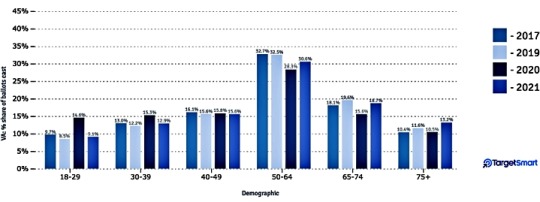
VOTE! If you live outside Virginia but know people there, send them a quick message to remind them to vote.
There's no such thing as an unimportant election.
#virginia#state government#election 2023#virginia legislature#virginia senate#virginia house of delegates#glenn youngkin#glenn trumpkin#republicans#abortion#republicans always try to ban abortion#reproductive freedom#roe v.wade#dobbs v. jackson women's health organization#a woman's right to choose#pro-choice#younger voters#the youth vote#there is no such thing as an unimportant election
15 notes
·
View notes
Text
Sen. Elizabeth Warren: suspend the filibuster to codify Roe v. Wade during the next Democratic trifecta
Alexander Bolton at The Hill:
Progressive Sen. Elizabeth Warren (D-Mass.) announced Wednesday that there are currently enough votes in the Senate to suspend the filibuster to codify Roe v. Wade and abortion rights if Democrats win control of the House and keep the Senate and White House. “We will suspend the filibuster. We have the votes for that on Roe v. Wade,” Warren said on ABC’s “The View.”
She said if Democrats control the White House and both chambers of Congress in 2025, “the first vote Democrats will take in the Senate, the first substantive vote, will be to make Roe v. Wade law of the land again in America.” The Massachusetts Democrat said her party would only need “skinny” majorities in the House and Senate to override the Supreme Court’s 2022 decision in Dobbs v. Jackson Women’s Health Organization, which overturned the national right to an abortion established by Roe v. Wade in 1973. “We can make Roe v. Wade law of the land if we have, and I have to be clear, we’ve got to have a majority in the House — skinny majority. We can take a really skinny majority in the Senate, I’ll take fifty. And a Democrat in the White House. We have those three things we will suspend the filibuster,” she said.
Speaking on ABC’s The View Wednesday, Sen. Elizabeth Warren (D-MA) supports the idea of suspending the filibuster to pass a Codify Roe bill should the Dems get a trifecta.
From the 07.17.2024 edition of ABC's The View:
youtube
#Roe v. Wade#Codify Roe#US Senate#119th Congress#Elizabeth Warren#Abortion#Reproductive Justice#Dobbs v. Jackson Women’s Health Organization#ABC#The View
249 notes
·
View notes
Text


This beautiful 1900 home in Dobbs Ferry, NY is architecturally different. 4bds, 4ba, $1.749M.


In the entrance hall, the stairs and fireplace have a very unusual placement. And, note the bas relief top of the fireplace.


The living room has a very nice fireplace, but it's a little on the plain side. The house is very bland and beige, but it could be spectacular with the right decor.

The hall fireplace is dead on seen thru the dining room doors.


The large dining room has a fireplace style in its own right.



The kitchen is unique and I would call it homey. There's plenty seating in the corner family area.

Very nice roomy .5 bath.


The spacious primary bedroom has a window seat and a separate seating area with a fireplace.

Fully renovated shower room.

This bedroom has a brick fireplace and separate smaller space that's being used as a home office.

Even the smallest room is pretty big.

All the baths have been renovated.

The attic room even has a cute little fire place.

This is the window you can see from the outside at the top of the house. Love it, it's like a turret room and the walls are stick wood. This could be a very cool space.

What a wonderful terrace.

Beautifully finished basement.

The exterior of the home reminds me of a beach house.

There's a big sun porch on the 2nd fl. overlooking the yard.




The garden is beautiful. 5,663 sq ft lot

The Hudson River is visible from the upper floors of the house.
https://www.zillow.com/homedetails/188-Broadway-Dobbs-Ferry-NY-10522/33020612_zpid/
159 notes
·
View notes
Text
The nomination of Vice President Kamala Harris as the Democratic presidential candidate has shaken up the race in ways that have yet to fully play out. However, given the fact that she could become the first woman U.S. president, it is surely worthwhile to consider the role of the women’s vote in November’s election.
One need only look back to the 2022 midterm election, where the women’s vote was arguably instrumental in rebuffing a predicted “red wave,” leading Democrats to exceed electoral expectations. That election occurred less than five months after the Supreme Court’s Dobbs decision that overturned Roe v. Wade, allowing states to greatly restrict access to abortion. This led to a greater-than-expected Democratic vote among women, especially young women, for House of Representatives and other state candidates.
Now, just weeks after most polls had President Joe Biden trailing his Republican rival Donald Trump, the emergence of Vice President Harris as the Democratic candidate has already injected enthusiasm among many Democrats, especially women. As my Brookings colleague Elaine Kamarck has argued, women’s health, abortion, and reproductive freedom—issues Harris has championed—will once again be leading issues for this election. Harris has also voiced support for issues important to women including paid parental leave, child care, and the economy, as well as other policies that have the support of many younger and minority women. Indeed, the broader support of women’s groups for Harris’s candidacy has already been evident in funding and outreach.
With Harris’s nomination, will new enthusiasm and a voting surge among women be enough to power her to victory in November? To address this question, this analysis first reviews the role of women’s votes in recent presidential elections and which women’s demographic groups were most favorable to Democratic candidates. It next shows how gender differences in voter turnout have provided women with a numerical electoral advantage over men. The analysis proceeds to look at changes in the demographic make-up of women voters, from 2012 through the present, showing the rise of Democratic-favorable groups within their ranks. It concludes with a voter simulation of 2024 election results showing what recent polls imply, if we assume that the new enthusiasm for Harris translates into higher voter turnout and increased Democratic support among women, both dynamics that could help increase her chances for victory in November.
Women have a history of backing Democratic candidates in presidential elections
Examining gender differences in presidential voting preferences shows that women have voted for Democrats over Republicans in every presidential election since 1984.1


This is evident for recent elections, as seen in Figure 1, which shows the D-R (Democratic minus Republican) vote margins by gender for presidential elections between 2000 and 2020. In each case, the D-R margins are positive for women and generally (though not always) negative for men, and women voted more strongly Democratic than men, regardless of whether a Democrat or Republican ultimately won the presidency.
Election year 2020 showed sharp gender disparities for the seven battleground states, displayed in Figure 2. In each of these states, only one of which (North Carolina) Trump carried, women registered positive D-R margins compared with negative margins for men. The widest gender disparities were in the three “blue wall” states of Wisconsin, Pennsylvania, and Michigan, as well the southern state of Georgia.

Gender differences also pervaded demographic groups in the 2020 presidential election (see figure 3), as was the case in earlier elections. D-R margins are higher for women than for men in groups where women voted strongly Democratic: Black voters, Hispanic voters, and voters aged 18 to 29. Even for non-college white women voters—who favored Republicans—the negative D-R margins are not as large as those of men. Only among Asian American voters were men’s D-R margins higher than women’s.
Women’s turnout rates are higher
Perhaps even more important than partisan preferences, turnout rates—the share of eligible voters who vote—will help dictate women’s influence in the coming election. Turnout rates for women have exceeded those for men in presidential elections dating back to 1980. Figure 4 depicts gender differences in turnout for presidential elections since 2000. The 2020 election showed the highest overall turnout rates in decades. Because of their higher turnout rates, and the fact that women live longer than men, the 2020 election had 9.7 million more female than male voters.


Largely because of their higher turnout rates, women comprised more than half of all voters (53%) in 2020. Yet their shares vary across demographic groups (see Figure 5). Women comprised 58% of all Black voters, 55% of Asian voters and 54% of Hispanic voters. Fifty-four percent (54%) of voters aged 65 and older were also women. And among white non-college graduate voters, a group that tends to vote Republican, women still comprised a majority (52%).
The female electorate is becoming more diverse and highly educated
As the size of the female electorate increases, its demographic makeup is changing. Figure 6 shows the shifts in the profile of eligible women voters between 2012 and 2024 by race and education. Notably, there are gains in women’s groups that tend to vote Democratic—white college graduates and people of color—and a decline in the women’s group that tends to vote Republican—white non-college graduates. For the first time in a presidential election, the latter group will make up less than 40% of the women’s electorate.


The seven battleground states, shown in Figure 7, also display similar shifts in the demographic profiles of their female electorates. In each, there is a decline in the share of white non-college graduate women, and an increase in the share of women of color. This is occurring in the “whiter” states of Wisconsin, Pennsylvania, and Michigan, as well as the more diverse states of Arizona, Nevada, Georgia, and North Carolina. In Nevada, for example, the share of women who identify as white non-college graduates declined from 48% in 2012 to 35% in 2024, while at the same time the share of women who identify as Black, Hispanic, Asian or other nonwhite races rose from 36% in 2012 to 47% in 2024. Thus, with respect to demographic attributes, the female electorates in each state have become more Democratic-leaning in their voter profiles.
Simulating the 2024 election after Harris announcement
Polls taken both before and after the shift from Biden to Harris as the likely Democratic nominee offer crude indications of what the 2024 election might hold. Three polls of likely voters conducted by the New York Times/Siena College on June 26, July 3, and July 25—after Biden bowed out of the race and endorsed Harris—reveal the changes that took place in men’s and women’s D-R voting margins (see Figure 8).
The D-R margins for women–at 14% for Harris vs. Trump on July 25, were especially high, though countered by a still-high negative D-R margin of 17% for men.


Still, the high women’s D-R margin favoring Harris greatly reduced the overall D-R margin compared with the earlier two Biden vs. Trump margins shown in Table 1. That is, in the two polls taken while Biden was still the assumed Democratic nominee, the negative D-R margins of -4% and -6% (44% Biden vs. 48% Trump on June 26; and 43% Biden vs. 49% Trump on July 3) strongly favored Trump. Yet, the July 25 poll for Harris vs. Trump reduced the D-R margin to just -0.6% (47.5 for Harris vs. 48.1 for Trump) when we applied this to a simulation model discussed below.
Of course, the July 25 poll was taken just after Biden withdrew and endorsed Harris as the likely Democratic nominee. Clearly, Harris’s campaign had not yet fully begun and the immediate support from many women’s groups suggests that both female turnout and voting preference could increase on Harris’s behalf in the weeks and months ahead. To estimate these likely effects, we conducted simulations of national D-R margins—a base simulation—and two additional simulations based on assumptions of greater women’s turnout and a stronger voter preference for Harris (see Table 1).
All three simulations begin with the 2024 national female and male eligible voter populations reported in the Census Bureau’s monthly Current Population Survey. The “base” simulation applies the 2020 election female and male voter turnout rates, presented above, and the Harris vs. Trump voter margins from the July 25 poll shown in Figure 8. The second simulation alters the base simulation by increasing women’s turnout rate by 10%, from 68.4% to 75.2%, larger than the 5.1% rise in female turnout which occurred between 2016 and 2020. The third simulation alters the second simulation by also increasing the female D-R voting margin by 5 percentage points.
The results in Table 1 show that while the base simulation yields a small Trump advantage, a 10% rise in women’s turnout would bring a small Harris advantage. Moreover, both increasing women’s turnout by 10% and the women’s D-R vote advantage by 5 percentage points would yield a clear Harris win (49.2% Harris vs. 46.3% Trump). These assumptions, reflecting a rise in women’s enthusiasm for Harris between now and Election Day, could put a popular vote win for her well within reach. It is also possible that the strong Trump voter preference for men, reported in the New York Times/Siena College poll, could shift as more male voters become familiar with her campaign.
The impact of an energized women’s voting base
The simulations conducted here make plain that rising women’s enthusiasm for Kamala Harris’s candidacy could lead to consequential shifts in the 2024 election through increases in voter turnout and voter preference. This is especially notable given the recent history of women’s support of Democratic candidates in national and congressional elections. Beyond looking at polls alone, simulations such as these show how taking into account the eligible voter base and rising voter turnout rates can affect election results.
These simulations should not be viewed as predictions; much will depend on how well Harris can continue to energize an already favorable female voter base. It also depends on her performance in crucial battleground states, which will determine how she fares in the Electoral College. What these simulations do show is how an enthusiastic voting bloc, when translated into voter turnout and voting preferences, could impact the final election result this coming November.
60 notes
·
View notes
Text
In an interview for a forthcoming book, Mrs. Clinton also suggested that if Donald Trump won in November “we may never have another actual election.”
Hillary Clinton criticized her fellow Democrats over what she described as a decades-in-the-making failure to protect abortion rights, saying in her first extended interview about the fall of Roe v. Wade that her party underestimated the growing strength of anti-abortion forces until many Democrats were improbably “taken by surprise” by the landmark Dobbs decision in 2022.
In wide-ranging and unusually frank comments, Mrs. Clinton said Democrats had spent decades in a state of denial that a right enshrined in American life for generations could fall — that faith in the courts and legal precedent had made politicians, voters and officials unable to see clearly how the anti-abortion movement was chipping away at abortion rights, restricting access to the procedure and transforming the Supreme Court, until it was too late.
“We didn’t take it seriously, and we didn’t understand the threat,” Mrs. Clinton said. “Most Democrats, most Americans, did not realize we are in an existential struggle for the future of this country.”
She said: “We could have done more to fight.”
Mrs. Clinton’s comments came in an interview conducted in late February for a forthcoming book, “The Fall of Roe: The Rise of a New America.”
The interview represented Mrs. Clinton’s most detailed comments on abortion rights since the Supreme Court decision that led to the procedure becoming criminalized or restricted in 21 states. She said not only that her party was complacent but also that if she had been in the Senate at the time she would have worked harder to block confirmation of Trump-appointed justices.
And in a blunt reflection about the role sexism played in her 2016 presidential campaign, she said women were the voters who abandoned her in the final days because she was not “perfect.” Overhanging the interview was the understanding that had she won the White House, Roe most likely would have remained a bedrock feature of American life. She assigned blame for the fall of Roe broadly but pointedly, and notably spared herself from the critique.
Some Democrats will most likely agree with Mrs. Clinton’s assessment. But as the party turns its focus to wielding abortion as an electoral weapon, there has been little public reckoning among Democrats over their role in failing to protect abortion rights.
Even when they held control of Congress, Democrats were unwilling to pass legislation codifying abortion rights into federal law. While frequently mentioned in passing to rally their base during election season, the issue rarely rose to the top of their legislative or policy agenda. Many Democrats, including President Biden, often refused even to utter the word.
Until Roe fell, many in the party believed the federal right to an abortion was all but inviolable, unlikely to be reversed even by a conservative Supreme Court. The sense of denial extended to the highest ranks of the party — but not, Mrs. Clinton argued, to her.
“One thing I give the right credit for is they never give up,” she said. “They are relentless. You know, they take a loss, they get back up, they regroup, they raise more money.” She added: “It’s tremendously impressive the way that they operate. And we have nothing like it on our side.”
Mrs. Clinton did not express regret for any inaction herself. Rather, she said her efforts to raise alarms during her 2016 campaign went unheeded and were dismissed as “alarmist” by voters, politicians and members of her own party. In that race, she had talked about the threats to abortion rights on the campaign trail and most memorably in the third presidential debate, vowing to protect Roe when Mr. Trump promised to appoint judges who would overturn it.
But even then, internal campaign polling and focus groups showed that the issue did not resonate strongly with key groups of voters, because they did not believe Roe was truly at risk.
Now, as the country prepares to face its third referendum on Mr. Trump, she offered a stark warning about the 2024 election. A second Trump administration would go far beyond abortion rights to target women’s health care, gay rights, civil rights — and even the core tenets of American democracy itself, she said.
“This election is existential. I mean, if we don’t make the right decision in this election in our country, we may never have another actual election. I will put that out there because I believe it,” she said. “And if we no longer have another actual election, we will be governed by a small minority of right-wing forces that are well organized and well funded and are getting exactly what they want in terms of turning the clock back on women.”
Mrs. Clinton described those forces and her former opponent as part of a “global phenomena” restricting women’s rights, pointing to a push by Xi Jinping, the Chinese leader, pressing women to focus on raising children; the violent policing of women who violate Iran’s conservative dress code; and what she described as the misogyny of President Vladimir V. Putin of Russia.
“Authoritarians, whether they be political or religious based, always go after women. It’s just written in the history. And that’s what will happen in this country,” Mrs. Clinton said.
Mrs. Clinton viewed her remarks as another attempt to ring an alarm before the 2024 election.
“More people have got to wake up, because this is the beginning,” she said. “They really want us to just shut up and go home. That’s their goal. And nobody should be in any way deluded. That’s what they will force upon us if they are given the chance.”
But she also seemed to expect that many would dismiss her concerns once again. “Oh, my God, there she goes again,” she said, describing what she anticipated would be the reaction to her interview. “I mean, she’s just so, you know, so out there.”
But she added: “I know history will prove me right. And I don’t take any comfort in that because that’s not the kind of country or world I want for my grandchildren.”
Nearly eight years after her final campaign, Mrs. Clinton remains one of the most prominent women in American politics, and the only woman in the country’s history to capture the presidential nomination of a major party.
Her life encapsulates what could be seen as the Roe era in American life. She embodies the professional and personal changes that swept the lives of American women over the past half-century. Roe was decided in 1973, the same year Mrs. Clinton graduated from law school. Its fall was accelerated in 2016 by her loss to Donald J. Trump, which set in motion a transformation of the Supreme Court.
Had Mrs. Clinton won the White House in 2016, history would have turned out very differently. She would most likely have appointed two or even three justices to the Supreme Court, securing an abortion-rights legal majority that probably would have not only upheld Roe but also delivered rulings that expanded access to the procedure.
Instead, Mrs. Clinton said Democrats neglected abortion rights from the ballot box to Congress to the Supreme Court.
Along with her prediction for the future, Mrs. Clinton offered a detailed assessment of the past. For her, the meaning of the ruling in Dobbs v. Jackson Women’s Health Organization was clear — and devastating.
“It says that we are not equal citizens,” she said, referring to women. “It says that we don’t have autonomy, agency and privacy to make the most personal of decisions. It says that we should be rethinking our lives and our roles in the world.”
She blasted Justice Samuel A. Alito Jr., who wrote the Supreme Court’s majority opinion in the case, saying his decision was “terrible,” “poorly reasoned” and “historically inaccurate.”
Mrs. Clinton accused four justices — John G. Roberts Jr., Neil M. Gorsuch, Brett M. Kavanaugh and Amy Coney Barrett — of being “teed up to do the bidding” of conservative political and religious organizations and leaders — though she believed many Democrats had not realized that during those justices’ confirmation hearings.
“It is really hard to believe that people are going to lie to you under oath, that even so-called conservative justices would upend precedents to arrive at ridiculous decisions on gun rights and campaign finance and abortion,” she said. “It’s really hard to accept that.”
Yet, she also had tough words for her former colleagues. In the Senate, she said, Democratic lawmakers did not push hard enough to block the confirmation of the justices who would go on to overturn federal abortion rights. When asked in confirmation hearings if they believed Roe was settled law, the nominees noted that Roe was precedent and largely avoided stating their opinion on the decision.
Those justices “all lied in their confirmation hearings,” she said, referring to Justices Gorsuch, Kavanaugh and Coney Barrett, all of whom were appointed by Mr. Trump. “They just flat-out lied. And Democrats did nothing in the Senate.”
She added: “If I’d still been in the Senate, and on the Judiciary Committee, I think, you know, I hope I would have tried to do more about what were just outright prevarications.”
It is unclear how Democrats could have stopped those justices from reaching the bench given that they did not control the Senate during their confirmation hearings. When Mr. Trump took office, Republicans also had unified control of 24 state legislatures, making it all but impossible for Democrats to stop conservatives from pushing through increasingly restrictive laws.
For years, she said, Democrats failed to “invest in the kind of parallel institutions” to the conservative legal establishment. Efforts to start the American Constitution Society, she said, never quite grew as large as the better established Federalist Society, a network of conservative lawyers, officials and justices that includes members of the Supreme Court.
“I just think that most of us who support the rights of women and privacy and the right to make these difficult decisions yourself, you know, we just couldn’t believe what was happening. And as a result, they slowly, surely and very effectively got what they wanted,” she said. “Our side was complacent and kind of taking it for granted and thinking it would never go away.”
Mrs. Clinton was born in 1947, when abortion was criminalized and contraception was banned or restricted in more than two dozen states. In Arkansas, where she practiced law while her husband served as governor, she watched the rise of the religious right and the anti-abortion movement.
From the time she arrived in Washington as first lady, Mrs. Clinton fought openly for abortion rights. She famously declared that “human rights are women’s rights, and women’s rights are human rights” in a 1995 speech at the World Conference on Women in Beijing. When she became a senator, Mrs. Clinton voted against the partial-birth abortion ban, unlike more than a dozen of her fellow Democrats. As Barack Obama’s secretary of state, she made a mission of expanding women’s reproductive health across the globe.
In 2016, Planned Parenthood endorsed her candidacy, the first time the organization waded into a presidential primary. In her campaign, Mrs. Clinton promised to appoint judges who would preserve Roe, opposed efforts in Congress to pass a 20-week abortion ban and pushed for the repeal of the Hyde Amendment, which banned the federal funding of abortions.
Even her language was updated. For years, when it came to abortion, she championed her belief in a phrase popularized by her husband during his 1992 presidential campaign: “safe, legal and rare.”
In a private, previously unreported meeting recounted in the book, campaign aides told Mrs. Clinton to drop the phrase during her 2016 run. Her staff explained that increasingly progressive abortion-rights activists thought calling for the procedure to be “rare” would offer a political concession to the anti-abortion movement. And with so many new restrictions being passed in conservative-controlled states, abortion was increasingly difficult to obtain, particularly for poorer women, making “rare” the wrong focus for their message. Abortion should be “safe, legal, accessible and affordable,” they told her.
“Well, that doesn’t make any sense,” she said in response at the time. “That’s stupid.”
In the interview, Mrs. Clinton said she quickly came to embrace the shift in language. What she and other Democrats had tried to do in 1992 with “safe, legal and rare” was “send a signal that we understand Roe v. Wade has a certain theory of the case about trimesters,” she explained. But by 2016, the world had changed.
“Too many women, particularly too many young women did not understand the effort that went into creating the underlying theory of Roe v. Wade. And the young women on my campaign made a very compelling argument that making it safe and legal was really the goal,” she said. “I kind of just pocketed the framework of Roe.”
Still, Mrs. Clinton felt like many of her warnings over the issue were ignored by much of the country.
When she delivered a speech in Wisconsin in March 2016, arguing that Supreme Court justices selected by Mr. Trump could “demolish pillars of the progressive movement,” Mrs. Clinton said that “people kind of rolled their eyes at me.”
Mrs. Clinton said she saw her defeat in that election as inextricable from her gender. As she has in the past, she blamed the former F.B.I. director James Comey’s last-minute reopening of the investigation of her private email server for her immediate defeat. Mr. Comey had raised questions about her judgment and called her “extremely careless” but recommended no criminal charges.Other political strategists have faulted her message, strategy and various missteps by her campaign for her loss in 2016.
“But once he did that to me, the people, the voters who left me, were women,” she said. “They left me because they just couldn’t take a risk on me, because as a woman, I’m supposed to be perfect. They were willing to take a risk on Trump — who had a long list of, let’s call them flaws, to illustrate his imperfection — because he was a man, and they could envision a man as president and commander in chief.”
Mrs. Clinton said she was shocked by how little the reports of Mr. Trump’s sexual misconduct and assault seemed to affect the race. They did not disqualify him from the presidency, at least not among most Republicans and conservative Christians. But his promises to appoint justices that would reverse Roe helped him win, she said.
“Politically, he threw his lot in with the right on abortion and was richly rewarded,” she said.
82 notes
·
View notes